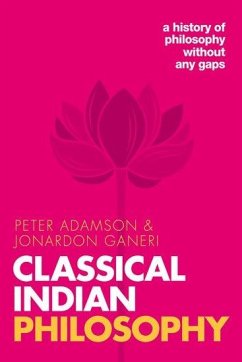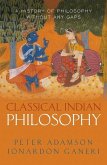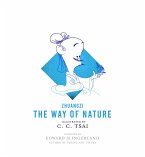Peter Adamson, Jonardon Ganeri (University of Toronto)
Classical Indian Philosophy
A History of Philosophy Without Any Gaps, Volume 5
20,99 €
inkl. MwSt.
Versandfertig in 2-4 Wochen

10 °P sammeln
Peter Adamson, Jonardon Ganeri (University of Toronto)
Classical Indian Philosophy
A History of Philosophy Without Any Gaps, Volume 5
- Broschiertes Buch
- Merkliste
- Auf die Merkliste
- Bewerten Bewerten
- Teilen
- Produkt teilen
- Produkterinnerung
- Produkterinnerung
Adamson and Ganeri present a lively introduction to one of the world's richest intellectual traditions: the philosophy of classical India. They guide us through such famous works as the Vedas and the Upanisads, and tell the stories of how Buddhism and Jainism developed. Anyone curious about South Asian philosophy can start here.
Andere Kunden interessierten sich auch für
![Classical Indian Philosophy Classical Indian Philosophy]() Peter AdamsonClassical Indian Philosophy37,99 €
Peter AdamsonClassical Indian Philosophy37,99 €![Living Yoga Living Yoga]() Swami SatchidanandaLiving Yoga53,99 €
Swami SatchidanandaLiving Yoga53,99 €![Intelligence and Intelligibility Intelligence and Intelligibility]() G. E. R. Lloyd (Emeritus Professor of Ancient Philosophy and SciencIntelligence and Intelligibility33,99 €
G. E. R. Lloyd (Emeritus Professor of Ancient Philosophy and SciencIntelligence and Intelligibility33,99 €![Classical Philosophy Classical Philosophy]() Peter AdamsonClassical Philosophy30,99 €
Peter AdamsonClassical Philosophy30,99 €![Daodejing Daodejing]() LaoziDaodejing16,99 €
LaoziDaodejing16,99 €![The Way of Nature The Way of Nature]() ZhuangziThe Way of Nature19,99 €
ZhuangziThe Way of Nature19,99 €![The Taoist Classics, Volume Three: The Collected Translations of Thomas Cleary The Taoist Classics, Volume Three: The Collected Translations of Thomas Cleary]() Thomas ClearyThe Taoist Classics, Volume Three: The Collected Translations of Thomas Cleary46,99 €
Thomas ClearyThe Taoist Classics, Volume Three: The Collected Translations of Thomas Cleary46,99 €-
-
-
Adamson and Ganeri present a lively introduction to one of the world's richest intellectual traditions: the philosophy of classical India. They guide us through such famous works as the Vedas and the Upanisads, and tell the stories of how Buddhism and Jainism developed. Anyone curious about South Asian philosophy can start here.
Hinweis: Dieser Artikel kann nur an eine deutsche Lieferadresse ausgeliefert werden.
Hinweis: Dieser Artikel kann nur an eine deutsche Lieferadresse ausgeliefert werden.
Produktdetails
- Produktdetails
- A History of Philosophy
- Verlag: Oxford University Press
- Seitenzahl: 432
- Erscheinungstermin: 27. April 2022
- Englisch
- Abmessung: 194mm x 127mm x 34mm
- Gewicht: 556g
- ISBN-13: 9780192856746
- ISBN-10: 019285674X
- Artikelnr.: 62354137
- Herstellerkennzeichnung
- Libri GmbH
- Europaallee 1
- 36244 Bad Hersfeld
- gpsr@libri.de
- A History of Philosophy
- Verlag: Oxford University Press
- Seitenzahl: 432
- Erscheinungstermin: 27. April 2022
- Englisch
- Abmessung: 194mm x 127mm x 34mm
- Gewicht: 556g
- ISBN-13: 9780192856746
- ISBN-10: 019285674X
- Artikelnr.: 62354137
- Herstellerkennzeichnung
- Libri GmbH
- Europaallee 1
- 36244 Bad Hersfeld
- gpsr@libri.de
Peter Adamson received his BA from Williams College and PhD in Philosophy from the University of Notre Dame. He worked at King's College London from 2000 until 2012. He subsequently moved to the Ludwig-Maximilians-Universität München, where he is Professor of Late Ancient and Arabic Philosophy. He has published widely in ancient and medieval philosophy, and is the host of the History of Philosophy podcast. Jonardon Ganeri is a Fellow of the British Academy. He is the author of Attention, Not Self (2017), The Self (2012), The Lost Age of Reason (2011), and The Concealed Art of the Soul (2007). Ganeri's work draws on a variety of philosophical traditions to construct new positions in the philosophy of mind, metaphysics, and epistemology. He became the first philosopher to win the Infosys Prize in the Humanities in 2015.
Origins
1: Begin at the End: Introduction to Indian Philosophy
2: Scriptures, Schools, and Systems: A Historical Overview
3: Kingdom for a Horse: India in the Vedic Period
4: Hide and Seek: The Upanisads
5: Indra's Search: The Self in the Upanisads
6: You Are What You Do: Karma in the Upanisads
7: Case Worker: Panini's Grammar
8: Suffering and Smiling: The Buddha
9: Crossover Appeal: The Nature of the Buddha's Teaching
10: Carry a Big Stick: Ancient Indian Political Thought
11: Better Half: Women in Ancient India
12: Grand Illusion: Dharma and Deception in the Mahabharata
13: World on a String: The Bhagavad-gita
14: Mostly Harmless: Non-Violence
The Age of the Sutra
15: A Tangled Web: The Age of the Sutra
16: When in Doubt: The Rise of Skepticism
17: Master of Ceremonies: Jaimini's Mimamsa-sutra
18: Innocent Until Proven Guilty: Mimamsa on Knowledge and Language
19: Source Code: Badarayaa's Vedanta-sutra
20: No Two Ways About It: Sakara and Advaita Vedanta
21: Communication Breakdown: Bhartrhari on Language
22: The Theory of Evolution: isvarakrsna's Samkhya-karika
23: Who Wants to Live Forever? Early ayurvedic Medicine
24: Practice Makes Perfect: Patañjali's Yoga-sutra
25: Where There's Smoke There's Fire: Gautama's Nyaya-sutra
26: What You See Is What You Get: Nyaya on Perception
27: Standard Deductions: Nyaya on Reasoning
28: The Truth Shall Set You Free: Nyaya on the Mind
29: Fine Grained Analysis: Kanada's Vaisesika-sutra
30: The Whole Story: Vaisesika on Complexity and Causation
31: A Day in the Life: Theories of Time
32: The Wolf's Footprint: Indian Naturalism
33: Mind out of Matter: Materialist Theories of the Self
Buddhists and Jainas
34: We Beg to Differ: The Buddhists and Jainas
35: It All Depends: Nagarjuna on Emptiness
36: Motion Denied: Nagarjuna on Change
37: No Four Ways About It: Nagarjuna's Tetralemma
38: Taking Perspective: The Jaina Theory of Standpoints
39: Well Qualified: The Jainas on Truth
40: Change of Mind: Vasubandhu and Yogacara Buddhism
41: Who's Pulling Your Strings? Buddhaghosa on No-Self and Autonomy
42: Under Construction: Dignaga on Perception and Language
43: Follow the Evidence: Dignaga's Logic
44: Doors of Perception: Dignaga on Consciousness
Beyond Ancient India
45: In Good Taste: The Rasa Aesthetic Theory
46: Learn by Doing: Tantra
47: Looking East: Indian Influence on Greek Thought
48: The Buddha and I: Indian Influence on Islamic and European Thought
49: What Happened Next: Indian Philosophy After Dignaga
1: Begin at the End: Introduction to Indian Philosophy
2: Scriptures, Schools, and Systems: A Historical Overview
3: Kingdom for a Horse: India in the Vedic Period
4: Hide and Seek: The Upanisads
5: Indra's Search: The Self in the Upanisads
6: You Are What You Do: Karma in the Upanisads
7: Case Worker: Panini's Grammar
8: Suffering and Smiling: The Buddha
9: Crossover Appeal: The Nature of the Buddha's Teaching
10: Carry a Big Stick: Ancient Indian Political Thought
11: Better Half: Women in Ancient India
12: Grand Illusion: Dharma and Deception in the Mahabharata
13: World on a String: The Bhagavad-gita
14: Mostly Harmless: Non-Violence
The Age of the Sutra
15: A Tangled Web: The Age of the Sutra
16: When in Doubt: The Rise of Skepticism
17: Master of Ceremonies: Jaimini's Mimamsa-sutra
18: Innocent Until Proven Guilty: Mimamsa on Knowledge and Language
19: Source Code: Badarayaa's Vedanta-sutra
20: No Two Ways About It: Sakara and Advaita Vedanta
21: Communication Breakdown: Bhartrhari on Language
22: The Theory of Evolution: isvarakrsna's Samkhya-karika
23: Who Wants to Live Forever? Early ayurvedic Medicine
24: Practice Makes Perfect: Patañjali's Yoga-sutra
25: Where There's Smoke There's Fire: Gautama's Nyaya-sutra
26: What You See Is What You Get: Nyaya on Perception
27: Standard Deductions: Nyaya on Reasoning
28: The Truth Shall Set You Free: Nyaya on the Mind
29: Fine Grained Analysis: Kanada's Vaisesika-sutra
30: The Whole Story: Vaisesika on Complexity and Causation
31: A Day in the Life: Theories of Time
32: The Wolf's Footprint: Indian Naturalism
33: Mind out of Matter: Materialist Theories of the Self
Buddhists and Jainas
34: We Beg to Differ: The Buddhists and Jainas
35: It All Depends: Nagarjuna on Emptiness
36: Motion Denied: Nagarjuna on Change
37: No Four Ways About It: Nagarjuna's Tetralemma
38: Taking Perspective: The Jaina Theory of Standpoints
39: Well Qualified: The Jainas on Truth
40: Change of Mind: Vasubandhu and Yogacara Buddhism
41: Who's Pulling Your Strings? Buddhaghosa on No-Self and Autonomy
42: Under Construction: Dignaga on Perception and Language
43: Follow the Evidence: Dignaga's Logic
44: Doors of Perception: Dignaga on Consciousness
Beyond Ancient India
45: In Good Taste: The Rasa Aesthetic Theory
46: Learn by Doing: Tantra
47: Looking East: Indian Influence on Greek Thought
48: The Buddha and I: Indian Influence on Islamic and European Thought
49: What Happened Next: Indian Philosophy After Dignaga
Origins
1: Begin at the End: Introduction to Indian Philosophy
2: Scriptures, Schools, and Systems: A Historical Overview
3: Kingdom for a Horse: India in the Vedic Period
4: Hide and Seek: The Upanisads
5: Indra's Search: The Self in the Upanisads
6: You Are What You Do: Karma in the Upanisads
7: Case Worker: Panini's Grammar
8: Suffering and Smiling: The Buddha
9: Crossover Appeal: The Nature of the Buddha's Teaching
10: Carry a Big Stick: Ancient Indian Political Thought
11: Better Half: Women in Ancient India
12: Grand Illusion: Dharma and Deception in the Mahabharata
13: World on a String: The Bhagavad-gita
14: Mostly Harmless: Non-Violence
The Age of the Sutra
15: A Tangled Web: The Age of the Sutra
16: When in Doubt: The Rise of Skepticism
17: Master of Ceremonies: Jaimini's Mimamsa-sutra
18: Innocent Until Proven Guilty: Mimamsa on Knowledge and Language
19: Source Code: Badarayaa's Vedanta-sutra
20: No Two Ways About It: Sakara and Advaita Vedanta
21: Communication Breakdown: Bhartrhari on Language
22: The Theory of Evolution: isvarakrsna's Samkhya-karika
23: Who Wants to Live Forever? Early ayurvedic Medicine
24: Practice Makes Perfect: Patañjali's Yoga-sutra
25: Where There's Smoke There's Fire: Gautama's Nyaya-sutra
26: What You See Is What You Get: Nyaya on Perception
27: Standard Deductions: Nyaya on Reasoning
28: The Truth Shall Set You Free: Nyaya on the Mind
29: Fine Grained Analysis: Kanada's Vaisesika-sutra
30: The Whole Story: Vaisesika on Complexity and Causation
31: A Day in the Life: Theories of Time
32: The Wolf's Footprint: Indian Naturalism
33: Mind out of Matter: Materialist Theories of the Self
Buddhists and Jainas
34: We Beg to Differ: The Buddhists and Jainas
35: It All Depends: Nagarjuna on Emptiness
36: Motion Denied: Nagarjuna on Change
37: No Four Ways About It: Nagarjuna's Tetralemma
38: Taking Perspective: The Jaina Theory of Standpoints
39: Well Qualified: The Jainas on Truth
40: Change of Mind: Vasubandhu and Yogacara Buddhism
41: Who's Pulling Your Strings? Buddhaghosa on No-Self and Autonomy
42: Under Construction: Dignaga on Perception and Language
43: Follow the Evidence: Dignaga's Logic
44: Doors of Perception: Dignaga on Consciousness
Beyond Ancient India
45: In Good Taste: The Rasa Aesthetic Theory
46: Learn by Doing: Tantra
47: Looking East: Indian Influence on Greek Thought
48: The Buddha and I: Indian Influence on Islamic and European Thought
49: What Happened Next: Indian Philosophy After Dignaga
1: Begin at the End: Introduction to Indian Philosophy
2: Scriptures, Schools, and Systems: A Historical Overview
3: Kingdom for a Horse: India in the Vedic Period
4: Hide and Seek: The Upanisads
5: Indra's Search: The Self in the Upanisads
6: You Are What You Do: Karma in the Upanisads
7: Case Worker: Panini's Grammar
8: Suffering and Smiling: The Buddha
9: Crossover Appeal: The Nature of the Buddha's Teaching
10: Carry a Big Stick: Ancient Indian Political Thought
11: Better Half: Women in Ancient India
12: Grand Illusion: Dharma and Deception in the Mahabharata
13: World on a String: The Bhagavad-gita
14: Mostly Harmless: Non-Violence
The Age of the Sutra
15: A Tangled Web: The Age of the Sutra
16: When in Doubt: The Rise of Skepticism
17: Master of Ceremonies: Jaimini's Mimamsa-sutra
18: Innocent Until Proven Guilty: Mimamsa on Knowledge and Language
19: Source Code: Badarayaa's Vedanta-sutra
20: No Two Ways About It: Sakara and Advaita Vedanta
21: Communication Breakdown: Bhartrhari on Language
22: The Theory of Evolution: isvarakrsna's Samkhya-karika
23: Who Wants to Live Forever? Early ayurvedic Medicine
24: Practice Makes Perfect: Patañjali's Yoga-sutra
25: Where There's Smoke There's Fire: Gautama's Nyaya-sutra
26: What You See Is What You Get: Nyaya on Perception
27: Standard Deductions: Nyaya on Reasoning
28: The Truth Shall Set You Free: Nyaya on the Mind
29: Fine Grained Analysis: Kanada's Vaisesika-sutra
30: The Whole Story: Vaisesika on Complexity and Causation
31: A Day in the Life: Theories of Time
32: The Wolf's Footprint: Indian Naturalism
33: Mind out of Matter: Materialist Theories of the Self
Buddhists and Jainas
34: We Beg to Differ: The Buddhists and Jainas
35: It All Depends: Nagarjuna on Emptiness
36: Motion Denied: Nagarjuna on Change
37: No Four Ways About It: Nagarjuna's Tetralemma
38: Taking Perspective: The Jaina Theory of Standpoints
39: Well Qualified: The Jainas on Truth
40: Change of Mind: Vasubandhu and Yogacara Buddhism
41: Who's Pulling Your Strings? Buddhaghosa on No-Self and Autonomy
42: Under Construction: Dignaga on Perception and Language
43: Follow the Evidence: Dignaga's Logic
44: Doors of Perception: Dignaga on Consciousness
Beyond Ancient India
45: In Good Taste: The Rasa Aesthetic Theory
46: Learn by Doing: Tantra
47: Looking East: Indian Influence on Greek Thought
48: The Buddha and I: Indian Influence on Islamic and European Thought
49: What Happened Next: Indian Philosophy After Dignaga







